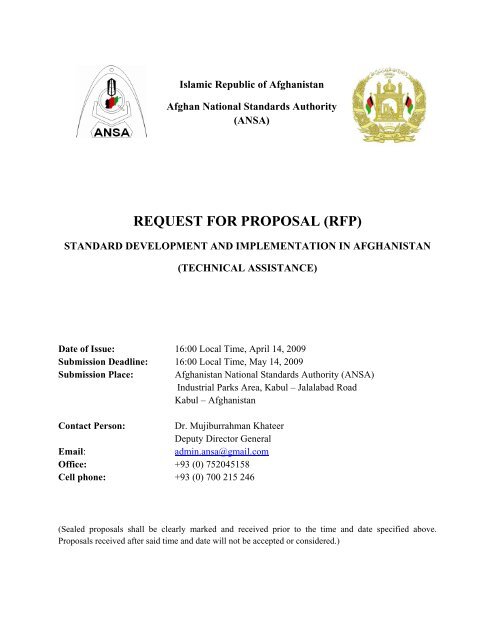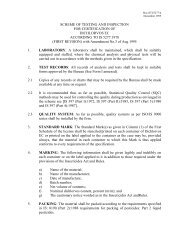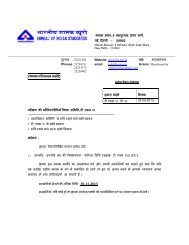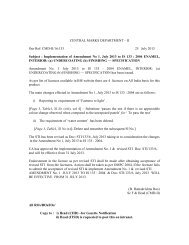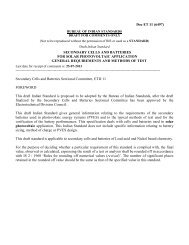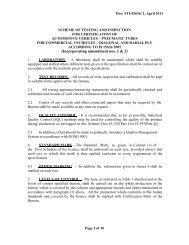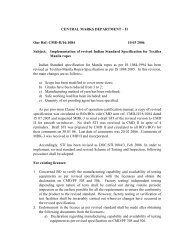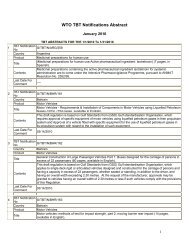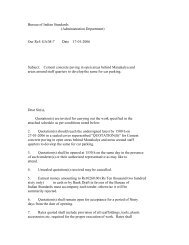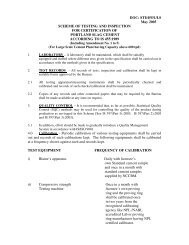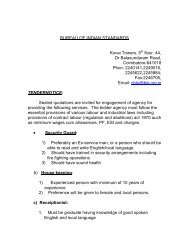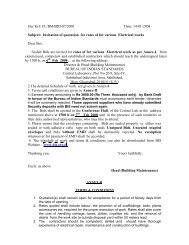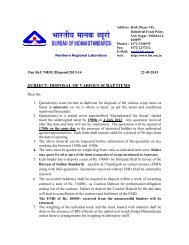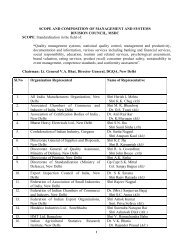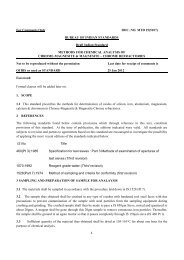REQUEST FOR PROPOSAL (RFP) - BIS
REQUEST FOR PROPOSAL (RFP) - BIS
REQUEST FOR PROPOSAL (RFP) - BIS
You also want an ePaper? Increase the reach of your titles
YUMPU automatically turns print PDFs into web optimized ePapers that Google loves.
Islamic Republic of AfghanistanAfghan National Standards Authority(ANSA)<strong>REQUEST</strong> <strong>FOR</strong> <strong>PROPOSAL</strong> (<strong>RFP</strong>)STANDARD DEVELOPMENT AND IMPLEMENTATION IN AFGHANISTAN(TECHNICAL ASSISTANCE)Date of Issue: 16:00 Local Time, April 14, 2009Submission Deadline: 16:00 Local Time, May 14, 2009Submission Place: Afghanistan National Standards Authority (ANSA)Industrial Parks Area, Kabul – Jalalabad RoadKabul – AfghanistanContact Person:Dr. Mujiburrahman KhateerDeputy Director GeneralEmail:admin.ansa@gmail.comOffice: +93 (0) 752045158Cell phone: +93 (0) 700 215 246(Sealed proposals shall be clearly marked and received prior to the time and date specified above.Proposals received after said time and date will not be accepted or considered.)
1. INTRODUCTIONAfghanistan Investment Climate Facility (AICF) has provided a grant to Afghanistan NationalStandards Authority (ANSA) for technical assistance to develop and implement standards in thecountry. The grantee is soliciting technical proposals from qualified firms to provide expertconsulting services to carry out the Technical Assistance.1.1. BackgroundANSA, the sole standards body in Afghanistan, has been making efforts to tackle thetechnical challenges that the Afghan private sector is facing regarding lack ofcompetitiveness, inaccessibility to more lucrative global markets, and the challenges of theinfant manufacturing industry being able to compete with the flood of importedcommodities. The absence of standards for many products is a huge negative influence inall of these areas.Since 2001 when the International Alliance toppled down the Taliban regime inAfghanistan, reconstruction of infrastructure has been a priority for the internationalcommunity and deemed as the main responsibility of the government of Afghanistan.Sustained economic growth is considered a pillar of success for the Afghan Governmentwhich envisages trade facilitation and economic reconstruction including the rules andinstitutions that enable the development of a market economy through diversified domesticproduction, effective import substitutions and gradual export promotion.More than two decades of conflict has turned the country into a consumption society whichmainly relies on imports and the country runs a trade deficit. Markets across the country arefull of low quality, mostly smuggled, but inexpensive, imported articles which make theenvironment tougher for domestic competitors. Production capability has progressivelydeclined and the embryonic manufacturing industry seems to be unable to compete with theflood of imports while there is no effective and efficient quality control on thesecommodities. Afghan exports have been limited to a few articles which have lost theircredibility in the world market and thus the traders are being pushed to send theirmerchandise through and from the name of neighboring countries. The general lack ofawareness of the importance of standards and the lack of institutional capacity to apply andenforce them have exacerbated problems at the factory level, where the lack of attention toproper sanitary conditions, for example, are posing considerable risks to product quality,market potential and even country credibility. This project focuses on the development andimplementation of standards.1.2. ObjectivesThe main objectives of this project are:• To increase the awareness of the private sector about (i) the benefits of applyingstandards in their products and operations, and (ii) the private sector’s role in2 of 9
developing National Standards, and to use this awareness as a key tool to ensurecompliance with voluntary standards.• To initiate development and application of National Standards in the current fivefields of ANSA’s operation plus in two new fields (textiles and electrical goods)through the establishment of technical infrastructure (in the form of TechnicalCommittees) for standardization, metrology, and conformity assessment.• To facilitate compliance with the standards introduced by building the capacity ofthe private sector to adopt national standards and international guidelines, and theissuance of Quality Certification for voluntary standards through establishment of anew unit within ANSA.1.3. Project ComponentsThe project has three components:(i) a sector awareness and outreach program focusing on the role and importance ofstandards, as a first step in ensuring successful standards implementation and as a keytool to ensure compliance with voluntary standards;(ii) Putting in place, through technical assistance, the institutional infrastructure (in theform of Technical Committees) leading to the development and application of NationalStandards in the current five fields of ANSA’s operation plus in two new fields (textilesand electrical goods); and(iii)Facilitating implementation of, and compliance with the standards introduced, through(i) capacity building for three targeted manufacturing/export sectors to apply thenational standards developed, as well as international guidelines and procedures (thecapacity building will include on-site guidance to ensure the standards are properlyapplied); and (ii) the issuance of Quality Certification as a compliance measure forvoluntary standards through the establishment of a new Implementation Unit withinANSA’s structure.The Terms of Reference (TOR) for the technical assistance is attached as Annex 1.1.4. Proposals to be SubmittedTechnical proposals are solicited from interested and qualified firms. The administrativeand technical requirements as detailed throughout the Request for Proposal (<strong>RFP</strong>) willapply. Specific proposal format and content requirements are detailed in Section 3.Financial proposals shall be submitted along with technical proposals. Upon detailedevaluation of the proposal, one firm will be selected for contract negotiation.1.5. Contract Funded By AICFThe contract will be funded by AICF in accordance with the terms and conditions of itsgrant to the grantee.3 of 9
2. Instruction to Proposers2.1. Project TitleThe project is called “Standard Development and Implementation in Afghanistan –Technical Assistance”.2.2. Examination of the Documentsofferors should carefully examine this <strong>RFP</strong>. It will be assumed that offerors have donesuch inspection and that through examinations, inquiries and investigations they havebecome familiarized with local conditions and nature of problems to be solved duringthe execution of the project.Offerors shall address all items as specified in this <strong>RFP</strong>. Failure to adhere to this formatmay disqualify an Offeror from further consideration.Submission of a proposal shall constitute evidence that the Offeror has made all theabove examinations and investigations, and is free of any uncertainty with respect toconditions that would affect the execution and completion of the project.2.3. Responsibility for CostOfferor shall be fully responsible for all costs incurred in the development andsubmission of the proposal or any cost incurred by Offeror prior to issuance of anagreement or contract. Neither AICF nor the grantee assumes any contractual obligationas a result of the issuance of the proposal request, the preparation or submission of aproposal by an Offeror, the evaluation of proposals, or final selection.2.4. ConfidentialityThe Grantee will use its best efforts to preserve the confidentiality of any businessproprietary or confidential information submitted by the Offerors, which is clearlydesignated as such by the Offeror.2.5. Language of ProposalAll proposal documents shall be prepared and submitted in English.2.6. Proposal Submission RequirementsThe Cover Letter in the proposal must be addressed to:Dr. Mujiburrahman KhateerDeputy Director GeneralAfghanistan National Standards Authority (ANSA)Address: Industrial Parks Area, Kabul – Jalalabad RoadKabul, AfghanistanAn original and two copies of the proposal must be received at the above address no laterthan 16:00 on 12 May 2009.Proposals may be either sent by mail, overnight courier, or hand-delivered. Upon timelyreceipt, all proposals become the property of the Grantee.2.7. PackagingEach proposal must be sealed to ensure confidentiality of the information. The proposalsshould be individually wrapped and sealed, and labeled for the content including4 of 9
“Original” or “Copy number x”; the original and two copies should be collectivelywrapped and sealed , and clearly marked for content. Neither AICF nor the Grantee willbe responsible for premature opening of proposals not properly labeled.2.8. Authorized SignatureThe proposal must contain the signature of a duly authorized officer or agent of theOfferor empowered with the right to bind the Offeror.2.9. Offeror QualificationsAs provided in Section 3, Offeror shall submit evidence that they have relevant pastexperience and have previously delivered advisory and technical assistance servicessimilar to those required in the TOR.2.10. Prime Contractor ResponsibilityOfferors have the option of subcontracting parts of the services they propose. TheOfferor’s proposal must include a description of any anticipated subcontractingarrangements, including the name, address, and qualifications of consultants andsubcontractors.2.11. AwardAn award resulting from this <strong>RFP</strong> shall be made to the best qualified Offeror, taking intoconsideration the evaluation factors set forth herein; however, the right is reserved toreject any and all proposals received and, in all cases, the Grantee will be the judge aswhether a proposal has or has not satisfactorily met the requirements of this <strong>RFP</strong>.2.12. Invoice and PaymentDeliverables under the contract shall be delivered on a schedule to be agreed upon in acontract with the Grantee. The Contractor may submit invoices to the designated GranteeProject Director in accordance with a schedule to be negotiated and included in thecontract. Upon approval of each invoice, the payment to the Contractor will be processed.All payments will be made in U.S. currency.3. Proposal Format and ContentTo expedite proposal review and evaluation, and to assure that each proposal receives thesame orderly review, all proposals must follow the format described in this section.Proposal sections and pages shall be properly numbered and the proposal shall include aTable of Contents. Offerors are encouraged to submit concise and clear responses to <strong>RFP</strong>.Proposals shall contain all elements of information requested without exception. Instructionsregarding the required scope and content are given in this section. The Grantee reserves theright to include any part of the selected proposal in the final contract.the proposal shall consist of technical and financial proposals. The following sections andcontents are required for each proposal:• Transmittal Letter• Cover/Title Page• Table of Contents• Introduction and Executive Summary• Company Information5 of 9
• Organizational Structure, Management Plan and Key Personnel• Technical Approach and Work Plan• Experience and Qualifications, and• Miscellaneous• Offerors are strongly encouraged to include in their experience summary primarily thoseprojects that are similar to or larger in scope than the technical assistance as described inthis <strong>RFP</strong>.4. Award CriteriaIndividual proposals will be initially evaluated by a Selection Committee of representativesfrom Grantee. The Committee will then conduct a final evaluation and completion of rankingof qualified Offerors, and the Grantee shall promptly negotiate a contract with the bestqualified Offeror. If a satisfactory contract cannot be negotiated with the best qualifiedOfferor, negotiation will be formally terminated. Negotiations shall then be undertaken withthe second most qualified Offeror and so forth.The selection of the Contractor will be based on the following criteria:CriteriaPertinent international experience instandards, particularly in central and southAsia, and especially standards technicalassistance and trainingExpertise and skills of proposed personnel instandards, including especially the priorityareas of construction materials, petroleumproducts (POL), pharmaceuticals andcosmetics, food, metrology, electrical goods,and textileProposed approach to the TA, includingtraining, legal/regulatory, administrative andinstitutional aspectsMax. Points4040206 of 9
ANNEX 1. TERMS OF REFERENCE (TOR)IntroductionThe overall objectives of Standard Development and Implementation in Afghanistan (hereinaftercalled the Project) are:• To increase the awareness of the private sector about (i) the benefits of applyingstandards in their products and operations, and (ii) the private sector’s role in developingNational Standards, and to use this awareness as a key tool to ensure compliance withvoluntary standards.• To initiate development and application of National Standards in the current five fields ofANSA’s operation i.e. petroleum products, construction materials, food, pharmaceuticalsand cosmetics and metrology plus in two new fields (textiles and electrical goods)through the establishment of technical infrastructure (in the form of TechnicalCommittees) for standardization, metrology, and conformity assessment.• To facilitate compliance with the standards introduced by building the capacity of theprivate sector to adopt national standards and international guidelines, and the issuance ofQuality Certification for voluntary standards through establishment of a new unit withinANSA.An experienced Contractor possessing a correspondingly broad and diverse skill set, coupledwith international perspectives, is required to assist the Grantee. It is essential that theContractor, from the very beginning, work in close collaboration with ANSA to set workingsessions with the other involved agencies like Export Promotion Agency of Afghanistan(EPAA), National Environment Protection Agency (NEPA), and Afghanistan InvestmentSupport Agency (AISA) as well. The objective is to coordinate with these agencies.Terms of ReferenceThe project will be implemented in three phases while the last two phases will overlap in someinstances:1. Preparatory Phase2. Standard Development Phase3. Standard Implementation PhaseThe Contractor shall commit to implementation of all three phases; however, the technical andfinancial bids at this stage will only cover the first phase. Financial as well as technical aspects oftwo next phases will be determined and agreed on by the end of the first phase.7 of 9
Preparatory PhaseTask 1. Need Assessment – The Contractor shall assign two experts to conduct a needassessment in four weeks. The capacities for constitution of the Technical Committee (TC) shallbe studied and a capacity building program needs to be developed (topics to be selected andmaterials to be collected) for ANSA officials. Requirements for awareness raising program shallbe identified. The Action Plan for the implementation of the project shall be reviewed for itsfeasibility.Deliverable: Upon completion of Task 1, the Contractor shall produce A Need Assessmentreport that includes:• The existing capacity and the areas to be strengthened for constitution of the TCs• A capacity building program for ANSA officials identifying the topics to be addressed,the references to be used with all training requirements and methods. The program shallmeet the approval of the Grantee.• The confirmed/amended Action Plan for the implementation of the project consideringthe twelve months duration of the projectTask 2 (a). Capacity Building – The Contractor shall assign one expert for each of the sevenoperation fields of petroleum products, food, construction materials, pharmaceuticals andCosmetics, metrology, electric goods, and textile to conduct the training program for ANSAofficials.Task 2 (b). Meetings with Potential TC Participants – The experts assigned by the Contractorshall assist in organizing and conducting meetings with industries, sector ministries andacademic institutions. The purpose of these meeting are to raise the awareness of the sector andpotential participants of the TCs of the benefits of standardization, the opportunities, and the waythey can participate in standard development as an attempt to ensure participation of all playersin TC. At least two or three meetings shall be held in each sector to identify potential participantsof the TCs.Task 2 (c). Technical Committees Regulation/Procedure – The draft TC regulation shall bereviewed and analysed to ensure that:• It is a practical document especially considering the constraints in Afghanistan with theavailable resources• The document clearly states the qualifications required for obtaining the membership ofthe TC with due consideration to the availability of experts and professionals inAfghanistan• It facilitates the process of standard development in the country8 of 9
Deliverables: An analytical report on the results of the capacity building program for ANSAofficials, the findings and perceptions from the meetings with stakeholders and finalized TCregulation shall be provided.Task 3 (a). TC Constitution – Seven TC for petroleum products, construction material, food,pharmaceuticals and cosmetics, metrology, textile and electrical goods shall be consitituted asper the TC regulation. Government, private sector and academic institutions and individualprofessionals shall be represented in a balanced manner in the TC. The structures of each TCshall be developed with one ANSA expert as the Coordinator.Task 3 (b). Workshop for TC Members – Since experience in establishing and operating TCsis lacking in Afghanistan and little expertise could be sought in coordinating the TC activitiesand standard development process, training workshops need to be conducted for selected TCmembers. At least one workshop for each TC shall be held and the agenda will include, amongothers, the followings:• How TC operates• The process of standard development• Specialized analyses of the refernce documents/ standards• How to use the refernces and where the resources could be soughtDeliverables: Informative report on seven TC constitution and the results of the workshops.Task 4. Final Report of Preparatory Phase – An analytical report shall be developed andsubmitted to the Grantee which will address the following issues besides the detailed report oncompletion of the first phase of the project:• An analyses of the standard development opportunities and constraints in Afghanistan• Action plan for Standard Development and Standard Implementation phases• Terms of Reference for the Technical Assistance required for next two phases• Physical, human resource and capacity requirements for implementation of the next twophases• Budget details for Technical Assistance required for next two phasesWith provision of this document the first phase will be completed. The Contractor shall be readyto start the next two phases in shortest possible time but not more than one month from theapproval of the budget plans for these phases.9 of 9


